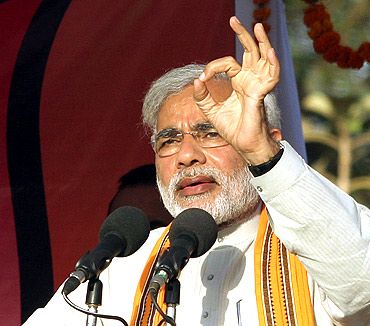 The Uttar Pradesh by-election will be the real test for the Modi government. By-election results are not a referendum on Modi but the time has come to analyse whether the Modi government is succeeding in assuring people that the promises it made would be fulfilled, says Dharmendra Kumar Singh.
The Uttar Pradesh by-election will be the real test for the Modi government. By-election results are not a referendum on Modi but the time has come to analyse whether the Modi government is succeeding in assuring people that the promises it made would be fulfilled, says Dharmendra Kumar Singh.
Eight days before it celebrates its 100 days in power at the Centre, the Bharatiya Janata Party on Monday received its second shock since its spectacular victory in the Lok Sabha elections in May.
The BJP got a jolt as the Congress and its allies bagged 10 out of 18 seats that went to the polls in Bihar, Madhya Pradesh, Punjab and Karnataka. The party had also had performed badly in by-elections to three seats in Uttarakhand.
Now the results in Bihar have raised many questions about the so called Narendra Modi wave. The BJP lost in six of the 10 seats in the crucial state. One need not read too much into these results but they give a certain indication about the possible permutations and combinations the opposition may use to contain the Modi wave, if any, in the country.
While reading a lot about these results, the poll arithmetic is escaping the necessary attention. The vote share of the BJP is almost intact. By getting the same percentage of votes the BJP won 31 seats out of 40 in the recently-concluded Lok Sabha elections. Had the Lalu Yadav-Nitish Kumar grand alliance been organised before the 2014 elections, the outcome might have been totally different.
The keenly-watched political situation in Bihar saw the unlikely alliance of former rivals Lalu’s Rashtriya Janata Dal and Nitish Kumar’s Janata Dal-United along with the Congress and the Nationalist Congress Party netting six seats. This grand alliance got around 45 per cent votes while the National Democratic Alliance got 38 per cent this time.
In the Lok Sabha election, the RJD’s vote share was 20.1 per cent, the JD-U got 15.8 per cent, the Congress got 8.4 per cent and the NCP got 1.2 per cent while the NDA’s share was 38 per cent. One should not compare the assembly by-election with the Lok Sabha results. The Lok Sabha election is contested on a national agenda, while by-elections are contested on local issues, local leaders and regional leaders.
Before drawing the line one has to understand what happened in Bihar before the 2010 assembly election. The BJP-JD-U combine won only five out of 18 seats in by-elections just before the assembly elections but swept the assembly in the same year.
The RJD played tactical politics to fielded four forward castes candidates to split BJP votes. All four candidates won the election. In the by-election, Modi and the BJP’s top leaders did not campaign even for a single seat while Nitish and Lalu extensively campaigned in almost all constituencies.
The results of these elections have given a window of opportunity to the anti-Modi political forces to come together. The BJP-led alliance will be at a disadvantage if opponents come together in other states too.
A win by the RJD-JD-U-Cong combine has provided a greater incentive to non-BJP parties who are otherwise at loggerheads, especially the Bahaujan Samaj Party, Samajwadi Party and the Congress in Uttar Pradesh to come together.
Lalu Yadav has already floated the idea that Mulayam Singh Yadav and Mayawati should come together to defeat communal forces but Mayawati so far has been refusing any talk of an alliance, though Mulayam is more than willing for such an understanding.
Mulayam is hoping that Lalu Yadav might mediate and a front can be cobbled together. The reality is that a front like this seems even less likely, especially given the difficulty the BSP has encountered in the past in getting the votes of the alliance partner transferred to its candidates.
Now either the Congress should mediate with both rival forces in the state or forge an alliance with one group in the coming by-elections to 11 assembly seats and one Lok Sabha seat scheduled for next month.
Obviously if three parties agree to an alliance then it will be challenge for the BJP in the communally-sensitive state or otherwise the saffron party is expected to sweep the state. The Congress as well as other anti-Modi forces may explore possibilities like the Bihar grand alliance in other states too.
Assembly elections are scheduled from October to February in Maharashtra, Haryana, Jammu & Kashmir, Jharkhand and probably Delhi. The BJP is expected to win in Maharashtra and Haryana but the litmus test of the Modi government will be in Jharkhand, Jammu & Kashmir and Delhi.
Lalu Yadav and Nitish Kumar may play a major role with the Congress and the Jharkhand Mukti Morcha to stop the BJP’s attempts to form government in Jharkhand where a major chunk of Babulal Marandi-led Jharkhand Vikas Morcha has already joined the BJP.
The BJP has coined ‘Mission 42+’ slogan seeking a clear majority on its own but JMM-RJD-JD-U-Congress alliance may give a real tough fight for the BJP. The Bihar’s results are not a setback for Modi government but they have certainly stopped the BJP juggernaut.
The Uttar Pradesh by-election will be the real test for the Modi government. By-election results are not a referendum on the Modi government but the time has come to analyse whether the Modi government is succeeding in assuring people that the promises it made would be fulfilled.
Dharmendra Kumar Singh is a political analyst.










